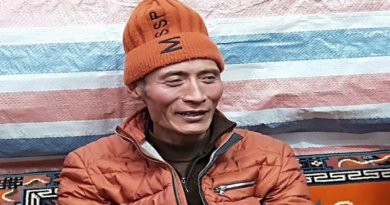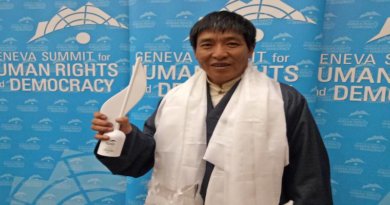Tibetans in Dharamsala celebrate 63rd Tibetan Democracy Day

By Tsering Choephel
DHARAMSALA, 2 Sept: A large number of Tibetans and the representatives of the three pillars of Tibetan democracy, as well as the members of the Tibetan Parliament-in-exile and officials of the Central Tibetan Administration (CTA), gathered today at the main temple in McLeod Ganj to participate in the official celebrations of the 63rd Tibetan Democracy Day.
With guests of honour from the Swedish parliamentary delegates from four different parties – the Moderate Party, Democrats Party, Christian Democrats Party, and Green Party – also attending the event were a few members of the Swedish Tibet Committee and delegates of CTA’s donors from different parts of the world.

The chief guest, Margareta Elisabeth Cederfelt, a member of the Swedish parliament and the head of the Swedish Tibet Friendship Parliamentary group, expressed admiration and support for the CTA’s “Middle Way” approach to the Tibetan freedom struggle.
She said, “This is a pragmatic solution to safeguard the vital interests of both parties. For Tibetans, it offers the protection and preservation of the identity and dignity of the Tibetan people. For China, it means maintaining the territorial integrity of the People’s Republic of China.”
President of the CTA Penpa Tsering and Khenpo Sonam Tenphel, the Speaker of the Tibetan Parliament-in-Exile (TPiE), delivered the official statement of the Kashag (Cabinet) and TPiE respectively and paid their deepest respect and gratitude to His Holiness the Dalai Lama for pioneering and tirelessly nurturing a democratic system for the well-being of the Tibetan people.
Penpa Tsering’s Kashag statements elucidated the phases of the evolution of the constitutional history of Tibet, harking back to the time of the first King of Tibet, Nyatri Tsenpo, followed by Songtsen Gampo in the 7th century, down to the reign of Gaden Phodrang, which survived until the annexation of Tibet by China.
Tibetan Democracy Day, as it is celebrated today, pays homage to a democratic beginning in exile led by the 14th Dalai Lama. With His Holiness the Dalai Lama’s promulgation of the Constitution in 1963, it “initiated major reforms in the traditional administrative structure and introduced a system of checks and balances among the three pillars of democratic governance.”
Despite many advancements and achievements of the Tibetan exile democracy, it faces challenges that require visions and revisions. The unhealthy divisions among the members of the parliament following the expulsion of three Judges of the Tibetan Supreme Justice Commission (TSJC) by the parliament and their “return” to the post without a standardized path are clear examples of the deficiencies in our democratic system that require continued amendment and nurturing.
“Last year, on Democracy Day, the Kashag appealed to constitute a charter review committee, and finally, the Parliament’s newly constituted Charter Review Committee has commenced its work. We, the Kashag, have also submitted our proposals. We earnestly hope that both the committee and the parliament will give due consideration to the insights and opinions received extensively from the general population, including the civil servants of the CTA.”
“For those of us who believe in the democratic principle of ultimate power residing in the hands of the people, a nation’s trajectory of progress depends upon the active participation of its citizens in shaping and implementing the CTA’s fundamental objective and public policies.”
Speaker Khenpo Sonam Tenphel, in his TPiE statement, expressed concerns about the deteriorating situation inside Tibet and condemned the intensifying sinicization policies being carried out there.
He also spoke about the Rules and Regulation Review Committee constituted under resolution No. 2023/17/5/5 during the 5th session of the 17th Tibetan Parliament-in-Exile.
“The mandate of this committee is to review the laws, rules, and regulations of the Central Tibetan Administration and submit its report and recommendations to the Parliamentary Secretariat by the end of Feb 2024. As such, the committee is already fully immersed in carrying out this task. The Tibetan Parliament-in-Exile remains hopeful that through this approach, greater clarity will be achieved in carrying out its work in accordance with the laws and rules and regulations governing the conduct of its business and affairs.”
Sikyong Penpa Tsering explained the absence of the usual cultural show at the event as a gesture of solidarity with the people of Himachal Pradesh state for their losses and sufferings caused by the disastrous monsoon this year. In addition, a day’s salary of all CTA staff is pledged in support of those affected by the monsoon havoc.
On September 2, 1960, the first Commission of Tibetan People’s Deputies from religious and provincial constituencies took their oath before His Holiness the Dalai Lama, thereby, formally inaugurating the Tibetan democratic system of governance.
The Dalai Lama devolved all his political authority to a democratically elected leader despite the impassioned appeals by the Parliament and the Tibetan people to stay on as the nominal head of state in 2011, thereby completing the transition to a secular democracy. This year marks 8 years since the devolution of political authority by His Holiness.






